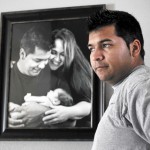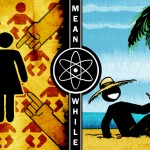Every Monday in Citizenship Confusion, Alan Noble discusses how we confuse our heavenly citizenship with citizenship to the state, culture, and the world.
For the past 20 (30?) years, the definitive political issue for Christians has been abortion. Protestants and Catholics have taken a strong stance against this practice, and rightfully so. Through legislation, picketing, bumper stickers, billboards, pamphlets, books, and clinics Christians have sought to speak out against a rhetoric and mindset that, in the name of the rights of the individual, allows US citizens to deny the significance of human life in the womb.
Unfortunately, while for the last few decades Christians have adamantly fought for the voiceless who are unborn, we have often done a very poor job of loving the mothers who make these tragic decisions, who are also often voiceless.
Last week at The Broken Telegraph, Tiffany Lucus confessed to terminating pregnancies. In a beautiful and heart wrenching post, she describes the anguish, shame, guilt, fear, and self-loathing that she experienced as a result of her decisions. It is possible to read her story as a cautionary tale for women who are considering abortion, another way to frighten women into giving birth. But to interpret her story this way would be to miss its larger significance: the church utterly failed to support her in love. Lucus writes:
“I have tried to take a stand. I have attempted to say ‘no.’ I have had my voice silenced and have ended up back in a shameful clinic, alone, believing that even God had left me. The protesters outside said as much. They said I was a murderer. The sticker on their car asked ‘What If Your Mom Had Aborted You?'”
I believe that many churches, Christians, and Christian organizations have begun to shift from a rhetoric of abortion as murder towards one of compassion. Practically, this means raising funds for clinics that can provide the financial, medical, and emotional support that women need in order to make a decision to keep a child. This does not mean that there is never a time to describe what abortion is, in all its ugly details. But it does mean that we have an obligation to love our neighbor: those inside the womb and those carrying someone inside their womb. If we have created a Christian culture where women who have had abortions feel as if God cannot love them, and that their friends will abandon them if they knew, and that they cannot seek assistance from the church out of shame, then we have failed to love.
For too long we have viewed the issue of abortion as a legal issue and an ideal, which allows us to separate ourselves from these mothers and their plight so that we can focus on the “right to life.” Lucus’s post reveals the inadequacy of this approach to abortion. Unless we see abortion as the result of a systemic problem involving economic, social, spiritual, communal, and physical causes, then we will never be able to meaningfully address this evil.
Near the beginning of her post, Lucus writes, “I have walked past protesters, I have begged God for another way, I have sat in shame in a clinic all by myself.” How might things have been different if those protesters had sought to enter into Lucus’s life and struggles, to walk beside her and perhaps even sit with her in that clinic, loving her even in her sin, so that she might never feel that Christ’s sacrifice belongs only to those who have not had abortions? For Lucus, the choice to have an abortion was never the result of ignorance about God’s view of this act: “I was well informed that my choice secured me a seat in Hell.” What was absent was not condemnation, knowledge, or conviction, it was support, love, and understanding.
I could be reading too much into Lucus’s story, but regardless of whether or not these observations are accurate in her case, it is certainly true that Christians by and large have viewed their responsibility towards fighting abortion as primarily a civic duty, one to be carried out through laws, protests, and signs. But what is required of us is that we work against abortion and the systemic causes that enable it through laws (when the opportunity is right), love, and compassion.











